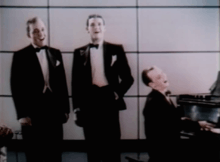The Rhythm Boys
| The Rhythm Boys | |
|---|---|
 | |
| Background information | |
| Origin | Los Angeles, California |
| Genres | Popular |
| Years active | 1925-1931 |
| Labels | Brunswick |
| Associated acts | Bing Crosby, Paul Whiteman |
| Members | |
The Rhythm Boys were a male singing trio consisting of Bing Crosby, Harry Barris and Al Rinker. Crosby and Rinker began performing together in 1925 and were recruited by Paul Whiteman in late 1926. Pianist/singer/songwriter Barris joined the team in 1927. They made a number of recordings with the Whiteman Orchestra and released singles in their own right with Barris on piano. They appeared with the Whiteman orchestra in the film King of Jazz (Universal Pictures, 1930), in which they sang "Mississippi Mud", "So the Bluebirds and the Blackbirds Got Together", "I'm a Fisherman", "Bench in the Park", and "Happy Feet". They are best remembered for launching Crosby's solo career, one that would make him the most influential entertainer of the twentieth century.
Beginnings
Bing Crosby and Al Rinker originally met in a band in Spokane, Washington while in college. The band was so popular that the two dropped out of college and drove Rinker's Model T to Los Angeles where Rinker's sister, Mildred Bailey, a locally known jazz singer was working. Shortly after their arrival, they landed a gig on the vaudeville circuit, as a vocal act. Some members of Paul Whiteman's Orchestra, caught their act and recommended them to Whiteman. Whiteman hired them in October of 1926. While waiting to join Whiteman's Orchestra they made their first record "I've Got the Girl" with Don Clark's Orchestra (a former member of Whiteman's Orchestra) at The Biltmore Hotel in Los Angeles (506 South Grand Ave.). Bing and Al then joined the Whiteman Orchestra in Chicago, where they made their first records with Whiteman.[1]
Reception
At first, the reception was bad for Crosby and Rinker. Whiteman's audience did not prefer them and the theatre manager (where they were playing) asked that their act should be dropped. Rather than drop them, Whiteman added a young singer and songwriter, Harry Barris to the act. The act was billed as the Rhythm Boys. The trio sang in three part harmony with both Rinker and Barris playing piano. Barris wrote a song called "Mississippi Mud" which became a hit with the Whiteman Orchesta and featured Bix Beiderbecke on cornet.[1]
Problems
After awhile, Whiteman and Crosby started to not get along. Bing had a drinking problem and that had landed him in jail a couple of times. He missed some of the filming of Whiteman's movie "King Of Jazz", after being involved in an drinking and driving incident. Whiteman got Crosby released from the jail. Crosby was escorted in handcuffs to the studio by police whenever he was scheduled to appear in the movie. [1]
Last performances and Break-up
After the movie was finally completed in 1930, Whiteman could not take it anymore and fired them. The Rhythm Boys then turned to the Gus Arnheim Orchestra at the Cocoanut Grove in Los Angeles. They recorded one song, Them There Eyes, with Arnheim's Orchestra for RCA Victor in November 1930.[2] They appeared in the 1931 film Confessions of a Co-Ed where they sang Ya Got Love and Crosby sang Out of Nowhere. Radio broadcasts from the Cocoanut Grove made Bing famous, but his drinking problems and risky behaviors caused him to start missing performances, and Crosby's pay was deducted from. Bing was featured more and more on his own, rather than with the Rhythm Boys, and in 1931, Bing recorded his first solo hit, I Surrender, Dear with Gus Arnheim and his Cocoanut Grove Orchestra. The Rhythm Boys quit playing at the club, walking out on their contract, but the local musicians' union banned them from playing at all, which caused the Rhythm Boys to break up. However, Bing's solo career took off after the break-up. Crosby went on to become the biggest entertainer of the twentieth century. [1]
Reunions
They reunited briefly to appear on the Paul Whiteman Presents radio show broadcast on July 4, 1943.
Trivia
Harry Barris was the uncle of television personality and producer Chuck Barris.
References
External links
- Paul Whiteman's Original Rhythm Boys
- Rhythm Boys Time, July 19, 1943
Sources
- Donald Shepherd and Robert F. Slatzer, Bing Crosby: The Hollow Man (New York: St. Martin's Press, 1981) ISBN 978-0-523-42164-3